-
Concerns raised about body-cavities explosives attack on aviation

Security services raised the possibility that al Qaeda affiliates may decide to mark the anniversary of the killing of Osama Bin Laden by sending suicide bombers with explosives inside their bodies to bring down airplanes; these experts point to an August 2009 attempt by a suicide body-bomber on a Saudi prince, and to the fact that U.S. drones earlier this year killed a Yemeni doctor who had devised medical procedures which could be used surgically to plant explosive devices in humans
-
-
Study challenges Russian investigation of Smolensk plane crash
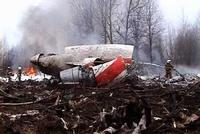
A new study by a team of experts of the 10 April 2010 plane crash near Smolensk, Russia, in which the Polish president, his wife, nine NATO generals and others were killed, raises pointed questions about the conclusions of the official Russian investigation into the incident, and points to contradictions and discrepancies in the report
-
-
Airport racial profiling app unveiled
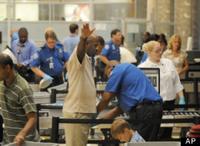
The New York-based Sikh Coalition, together with other civil rights organizations, is today unveiling a mobile application which allows users to report instances of racial profiling at airports in real time; users are prompted with some questions geared specifically toward Sikhs, but that the app also allows for accounts of discrimination from members of all communities who feel their rights have been violated
-
-
Intelligent surveillance to bolster Aussie national security
Researchers are working on developing smart technology that combines 2D and 3D video images taken from a variety of challenging environments and makes it possible to identify a person without the need to stand face on to a camera
-
-
Rhinoceros beetles foretell future of flapping-wing design

Researchers launch a quantitative investigation of aerodynamics and wing kinematics in rhinoceros beetle flight in order to shed new light on the evolution of flapping flight in nature; experimental study of the aerodynamic performance of beetles in forward/hovering flight will provide insight into designs for efficient and stable flapping-wing micro aerial vehicles
-
-
New report analyzes the airport security equipment sector
A new report offers a detailed business analysis of the leading 125 companies in the airport security equipment sector
-
-
Bi-plane to revive supersonic travel
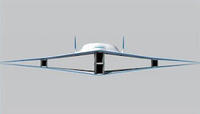
Researchers say that the best way to revive supersonic air travel – which came to an end with the retirement of the Concorde in 2003 – would be by building a plane with two wings to a side; computer models show that a bi-plan produces significantly less drag than a conventional single-wing aircraft at supersonic cruise speeds
-
-
House considers bill to send lost airport money to USO
Lawmakers are considering a bill that would send unclaimed money left at airport security checkpoints to the USO, a major armed forces support group
-
-
Global Entry program expands to four additional airports
CBP announced the expansion of the Global Entry program to four additional airports; the expansion will make the program available at airports serving 97 percent of international travelers arriving in the United States
-
-
Armed pilot program budget to be slashed in half
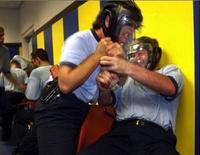
The Obama administration’s budget proposes cutting more than half the funding for a program that trains airline pilots to wield guns in the event of a terrorist takeover; the program is voluntary and consists of an intensive eight-day training course and a recurring training every six months; thousands of U.S. airline pilots have been trained to carry weapons as a final line of defense against terrorism
-
-
DHS report concludes airport scanners are safe
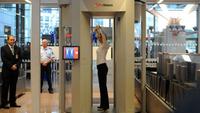
A new report by the DHS Inspector General concludes that the Transportation Security Administration’s (TSA) full body scanners are safe; the IG reviewed five independent studies and concluded that an airline passenger would have to be subjected to 17,000 screenings a year, or forty-seven a day, to reach the limit of acceptable radiation dosing
-
-
Air Marshals complain of rampant workplace discrimination
A recently released DHS Inspector General report found that feelings of discrimination against homosexuals, minorities, and veterans were rampant among the Federal Air Marshal service
-
-
Court: Malaysian woman can sue DHS over No-Fly List

A U.S. appeals court has cleared the way for a Malaysian woman to file a lawsuit against DHS and the FBI for mistakenly placing her on the No-Fly List and arresting her at San Francisco International Airport in 2005; Rahinah Ibrahim, who has never been accused of any crimes, was arrested and placed in a holding cell for two hours
-
-
Growing ubiquity of X-ray scanners could pose public health risk
Body scanners are now routinely deployed in airports, border check points, and even the streets of some American cities; with the use of X-ray scanners by law enforcement agencies becoming increasingly commonplace, health advocates worry that the additional radiation exposure could pose a health risk; repeated exposures to low-doses of radiation can lead to cancer; currently federal health standards are primarily limited to medical X-rays and since the body scanners do not fall under this category, the decision on where and how to use the devices is entirely up to security officials
-
-
New bill to allow more private screeners at airports
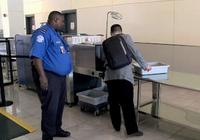
Private security companies could soon be taking over passenger screening at U.S. airports thanks to recently passed legislation that has cleared both the Senate and the House; the proposed law would require that the Transportation Security Administration (TSA) allow airports to switch to private contractors unless it can demonstrate that the move is not cost-effective and hinders security
-
More headlines
The long view
New Technology is Keeping the Skies Safe
DHS S&T Baggage, Cargo, and People Screening (BCP) Program develops state-of-the-art screening solutions to help secure airspace, communities, and borders
